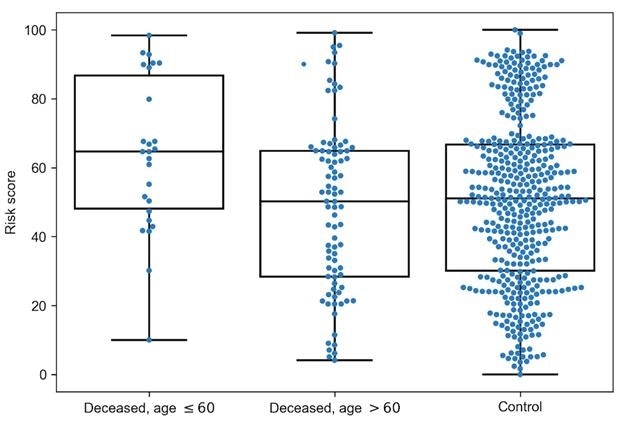For the first time, scientists from the Higher School of Economics (HSE) University have discovered the genetic predisposition of severe COVID-19 disease. The study results were published in the Frontiers in Immunology journal.

The risk score suggested by the researchers (vertical axis) is considerably higher in the group of patients suffering severe COVID-19 (sample of patients from Moscow) Image Credit: S.Nersisyan et al.
T-cell immunity is one of the crucial mechanisms employed by the human body to combat virus infections, and the staging ground for the development of cell immunity is the presentation of virus peptides on the infected cell surface.
This subsequently leads to the stimulation of T lymphocytes, which begins to destroy the infected cells. The potential to effectively present virus peptides is mostly governed by genetics. Human leukocyte antigen class I (HLA-I) molecules found in In human cells are responsible for this kind of presentation.
The group of six such molecules is exclusive in all human beings and is inherited from the parents of an individual. In other words, if the set of alleles effectively identifies the virus, then the immune cells will identify and kill the infected cells rapidly; if an individual has a set that is poor at such detection, then a more extreme case of disease could probably be observed.
The research team from the HSE Faculty of Biology and Biotechnology—Maxim Shkurnikov, Stepan Nersisyan, Alexei Galatenko, and Alexander Tonevitsky—along with collaborators from Pirogov Russian National Research Medical University and Filatov City Clinical Hospital (Tatjana Jankevic, Ivan Gordeev, and Valery Vechorko) examined the link between HLA-I genotype and COVID-19 severity.
With the help of machine learning, the researchers constructed a model that gives an integral assessment of the potential power of T-cell immune reaction to COVID-19: if the set of HLA-I alleles enables the effective presentation of the peptides of the SARS-CoV-2 virus, it means those people received a low-risk score, whereas individuals with lower presentation capability got higher risk scores (in the range of 0 to 100).
To verify the model, genotypes of more than 100 patients who experienced the COVID-19 infection and more than 400 healthy people (the control group) were examined. It was observed that the modeled risk score is extremely effective in estimating the COVID-19 severity.
Apart from examining the Moscow population, the team applied their model on a set of patients from Madrid in Spain. The excellent accuracy of prediction was also demonstrated on this independent sample: the risk score of patients suffering from severe COVID-19 disease was considerably greater than in patients who had mild to moderate cases of the diseases.
In addition to the discovered correlations between the genotype and COVID-19 severity, the suggested approach also helps to evaluate how a certain COVID-19 mutation can affect the development of T-cell immunity to the virus. For example, we will be able to detect groups of patients for whom infection with new strains of SARS-CoV-2 can lead to more severe forms of the disease.”
Alexander Tonevitsky, Researcher, Faculty of Biology and Biotechnology, HSE University
Source:
Journal reference:
Shkurnikov, M., et al. (2021) Association of HLA Class I Genotypes With Severity of Coronavirus Disease-19. Frontiers in Immunology. doi.org/10.3389/fimmu.2021.641900.